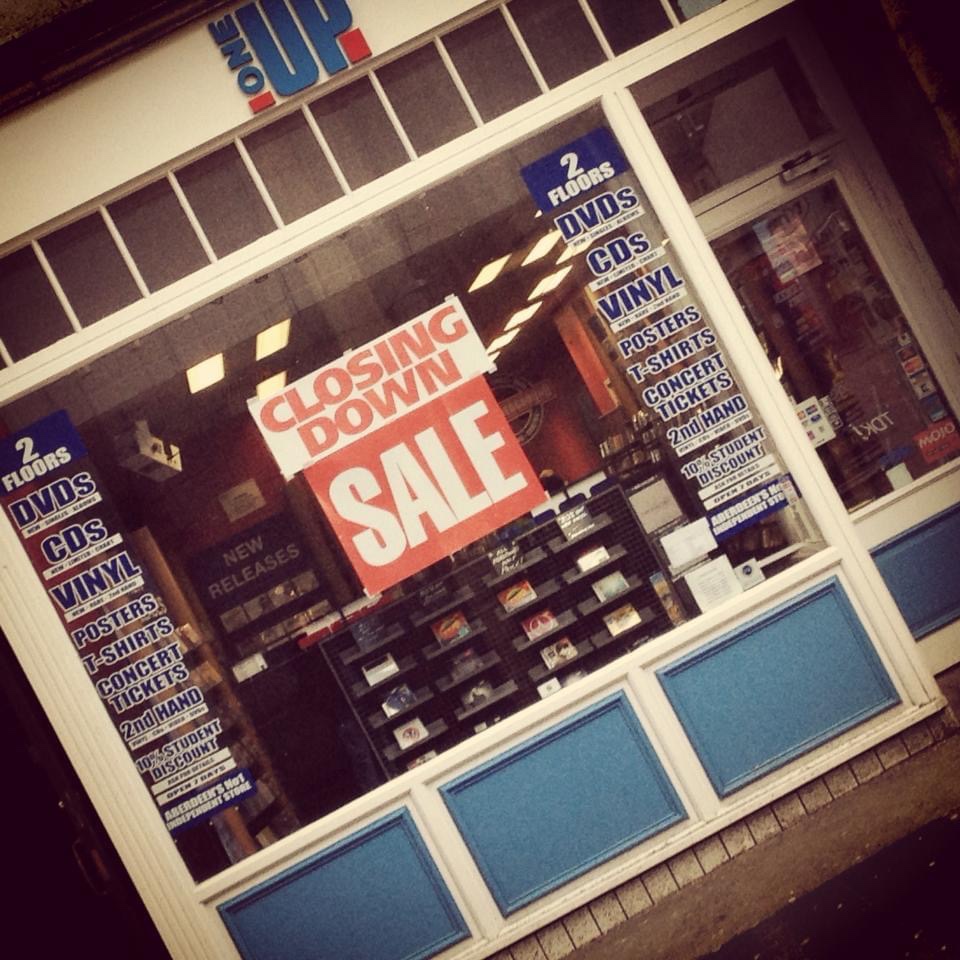Are you getting value or a bargain. Or neither?
There has been a bottle kill in the Scotty’s Drams household. But not the kind of bottle kill you would expect when reading a blog mostly concerned with whisky. This one is probably more important than any spirit as you can take it any time, any place and is vital for a decent fish finger sandwich. Of course, I’m speaking of Tomato ketchup.
Mrs Drams has repeatedly said that she doesn’t like the Heinz Ketchup as it’s tasteless, but she’s used to the more piquant Polish variety from the Eastern European shelves of the supermarket. A discussion ensued in which she said that Heinz was expensive, tasteless and that I should just buy the Tescos own brand sauce which is every bit as good. Being the good husband that I am, I acquiesced to her instructions in ordering a massive bottle of the Tesco brand in our next delivery. Shouldn’t be a problem, I mean how different can they be?
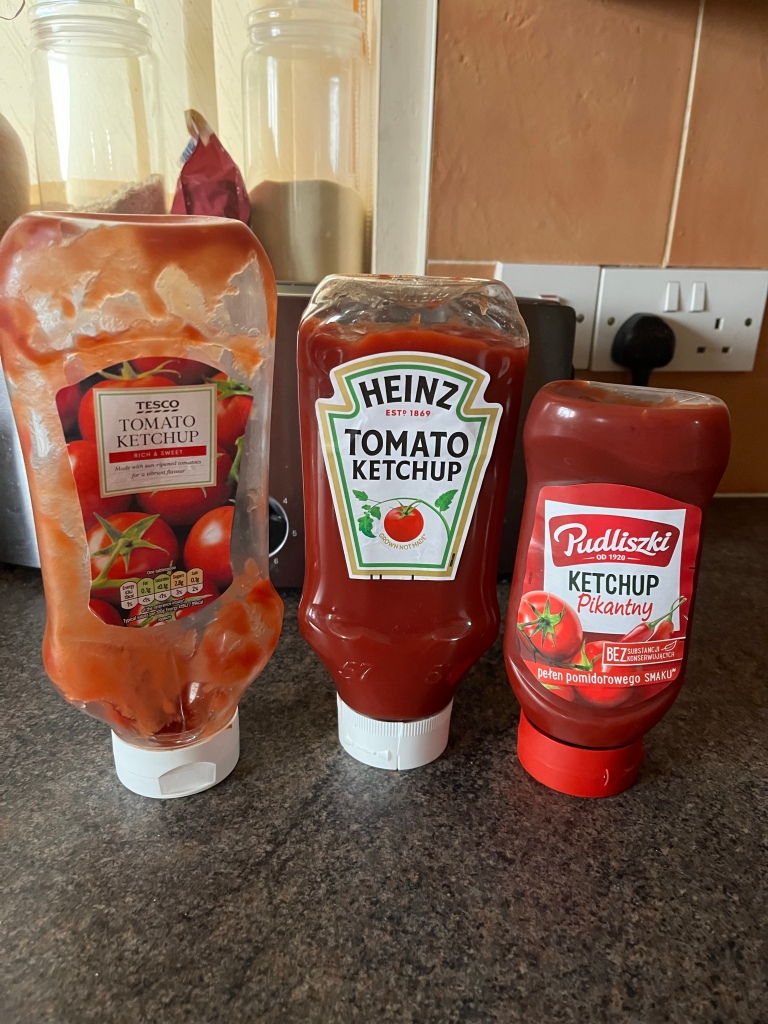
You see that’s where I made my first error. You should never listen to your wife on important decisions such as baked beans and tomato ketchup choices. The Tesco ketchup was ok, but it wasn’t Heinz. It was thinner, it was more vinegary and there wasn’t much more tomato taste if I were to be honest. I’ve counted down the days until the sauce bottle runs out as I’m too tight to bin it and purchase Heinz. Children are starving in Africa therefore I am not going to be responsible for wasting food. That’s the principle that I held onto with my supermarket Glen Keith and tried to with my Jura Journey. Both were very unloved but the GK showed signs of promise after 4 years of oxidation. Unfortunately the Jura became pleasant smelling but ineffective and expensive drain cleaner.
While the Tesco ketchup didn’t really float my boat, it is considerably cheaper than the brand with 57 varieties, but was cheaper better? In this case it wasn’t for me but Mrs Drams probably thought so. Similar happens with other shopping when looking for value and deciding whether to go for supermarket copies or the premium brands. So how do we start deciding what is a good value when we think about whisky? It perhaps could be similar to picking your groceries as there are so many subjectives, which doesn’t make it easy at all. Price is often the foremost and easiest thing thing we as whisky enthusiasts use to help us decide on a purchase. Some of us will have a budget and will need to stick with it, so bargains cannot be ignored. Pricing is a tricky thing to get right, as there is a problematic human trait that often assumes that the quality of something is directly connected to the price. Would Macallan be seen as a premium brand if you could buy a bottle of 18 year old for under £100? After all you can buy a few 18 year old whiskies (Glen Moray, Speyburn, Ledaig, AnCnoc and occasionally even Glenmorangie if on offer) for this or less at the time of writing. Some are a bit pricier, for example Glendronach 18 which can be bought online for £180. Is it much less of an enjoyable prospect than the similarly aged Macallan? The Double Cask 18 retails at around £300 and the Sherry Cask 18 is currently retailing around the £360 mark. I just don’t think our taste buds can actually taste the difference in price? What actual difference in experience are we getting?
I’m going to argue that the difference in value can be down to your perception of the brand. Is picking up a Macallan 18 at auction some 25% below retail cost a bargain, or is it good value? The crux of my thinking is that value is very much different to a bargain, for if you can buy that expensive whisky cheaper, then that would be a bargain, but it’s pointless in achieving such savings if you don’t like the whisky – the value is not there for you. And here is the difference. Value to me is getting something that gives you the satisfaction or performance of something you’d pay a lot more for normally – such as a whisky that cost £35 but tastes every bit as good as a £200 whisky you’ve recently tried. In reality that could be argued you got a bargain as well as good value.
Human nature towards value and bargains can be fickle and this can be shown in a disastrous period in the history of US retailer J.C Penney. The firm wasn’t performing as expected, so they called in Ron Johnson to pick things up and turn the business around. He had an impressive portfolio, having managed Target and being responsible for the design and running of Apple Stores. He had invited to be on the board of JC Penney and became CEO in 2011. One of the first things Ron Johnson did was spark a rebrand, trying to attract a younger crowd, something that he was used to at Apple, which a core of people see as attractive, modern and trendy – something that they wanted to and could easily identify with.
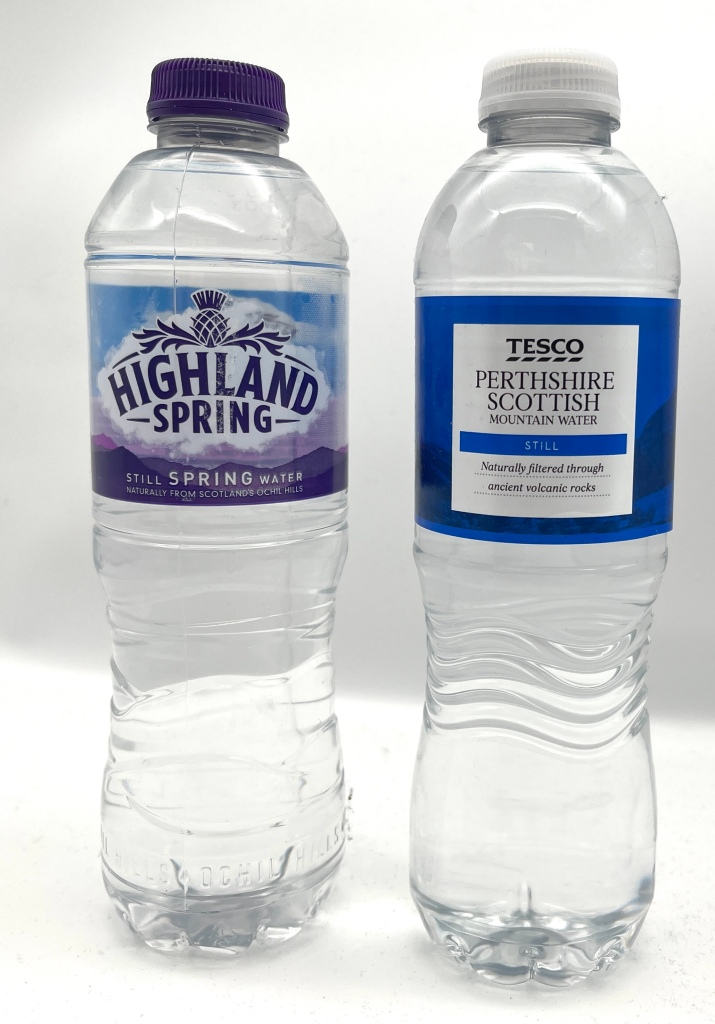
Johnson went a few steps further, such as discontinuing JC Penney’s store brands, replacing them with boutiques with branded merchandise, and ending the constant discounting and reliance of coupons, replacing it with fair and square pricing. Gone were the likes of 3 for 2 offers on clothing, replaced by better quality individual items for slightly higher prices than the bargain prices, but the more expensive items would last as long as the three bargain items combined as an example. What Johnson did was alienate his most loyal customers – lower middle class women, basically mothers, who wanted to snag a deal on homewares and clothing. Nor did he manage to snare the new customers the business needed, with the younger generation still seeing JC Penny’s as the uncool place your granny goes for cheapness. The man who was brought in to build up a business created one of the biggest American retail disasters.
What has this got to do with whisky? You see people resonate with experiences that reflect how they see themselves; it’s known as the self-reference effect. And it means if you don’t think a shop or experience offers an image that is reflective of how you identify yourself as, then you are more likely to avoid it. Human behaviour being what it is shows that people want to radiate success; to associate with being the best, eating the best foods, drinking the best beverages and supporting the most successful sports team (And in Scotland, that is Kingussie Camanachd shinty squad before anybody comes out with 55 titles or whatever it is). People want to feel good and when they make a a purchase of something that is perceived to be good, there is a rush of chemicals in the brain giving them a warm and fuzzy feeling for a while. So it is little wonder we’ve seen Bowmore tie up with Aston Martin and Macallan tie up with whoever wanted to prostitute themselves that week.
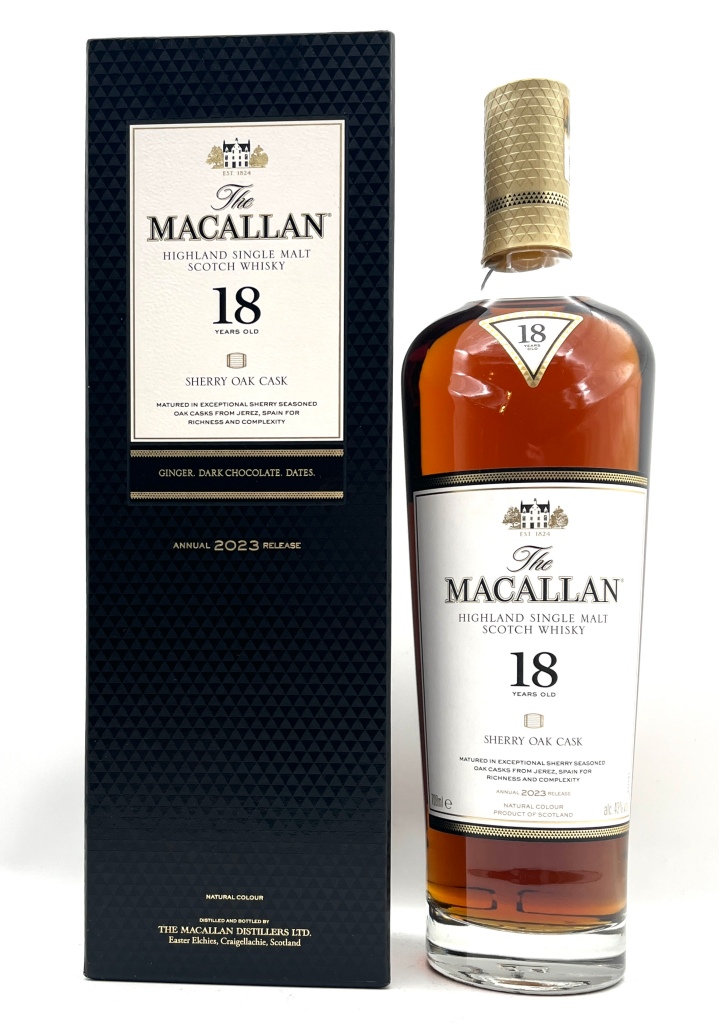
And these sorts of things are in my opinion the very acts that are driving the relentless march towards premiumisation. Essentially building a brand and marking a price point which may or may not reflect the production costs, such as Talisker 18 and it’s rise to stratospheric pricing levels. But it’s not fair to level the gunsights solely at Diageo, regardless of how you feel about them. Take a look at Brown Foreman and how much Glendronach has rocketed in price for its core range. Not so long ago, I could pick the 18 year old off the shelf for under £80. That was a bargain and great value when you consider the blending practices in place by Billy Walker that saw you getting a much older average age than the age statement would suggest. That’s superlative value. Similarly, the 21 is now in the region of £240 from a former price of around £120. I’m glad I bought mine back in the day. Mind you, it’s getting harder to source – a contact in the whisky retail industry suggested it’s mostly getting sent to the US, as that’s the market they want to target. And my insider also suggested that the removal of the NCF statement is because it is most likely getting aggressively filtered to prevent Scotch mist when ice is added. Doesn’t matter to me; at that price, I’m out.
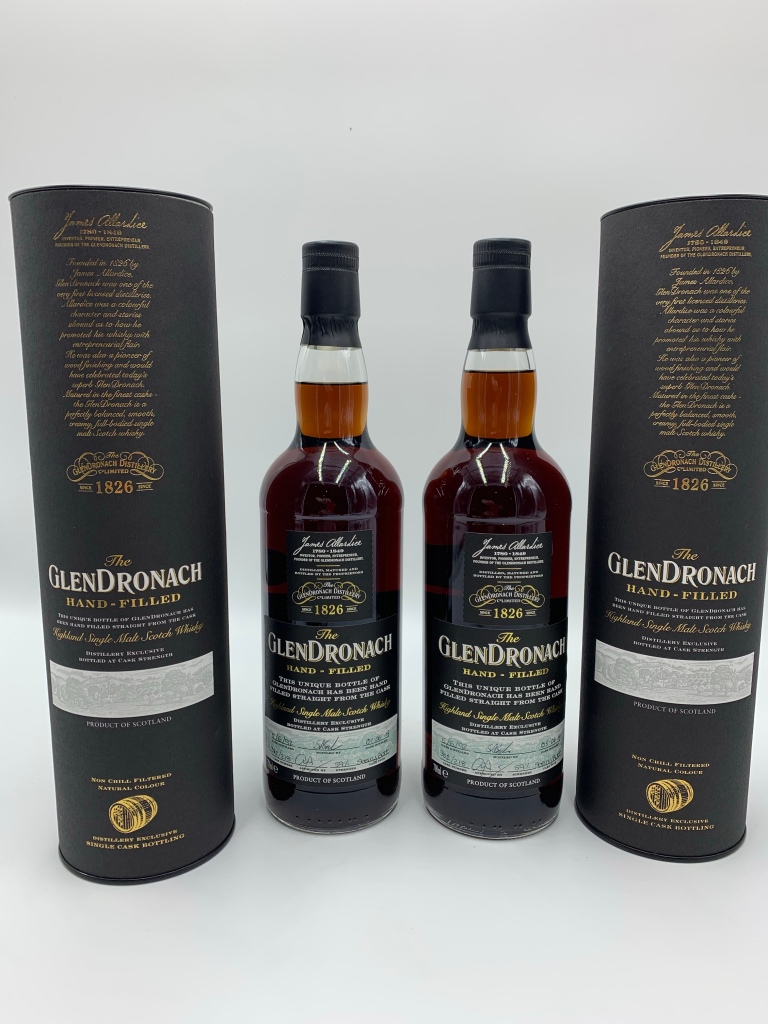
Without continuing to beat producers with a stick over pricing, there are some bottles that can justify a higher price. Is it value? No. Is it a bargain? No. Is it worth it? Subjective. I’m thinking of the likes of Convalmore. Last seen in Diageo’s special releases in 2017 at £1200 RRP, many decried that for a 32 year old whisky. You’ll probably never see it again as a special release as it has now been elevated to the Primo and Ultima range of super premium branding with an even larger price tag. Let us cool our jets before we erupt in self-righteous anger over another whisky taken out of the hands of the common drinker – the distillery closed in 1985, and was used as blending whisky. There was very little Convalmore available otherwise. Now by 2023, nearly 40 years later, there can’t be a lot left. As it’s genuinely a rarity, this will be what drives prices. And for good measure, the 36 year old 1977 Special release in 2013 was £600, so regular drinkers haven’t been imbibing Convalmore for some time, unless they had an independently bottled spirit; even then, try finding one – Convalmore has been blend fodder for years. Pity, as it’s actually a decent dram.
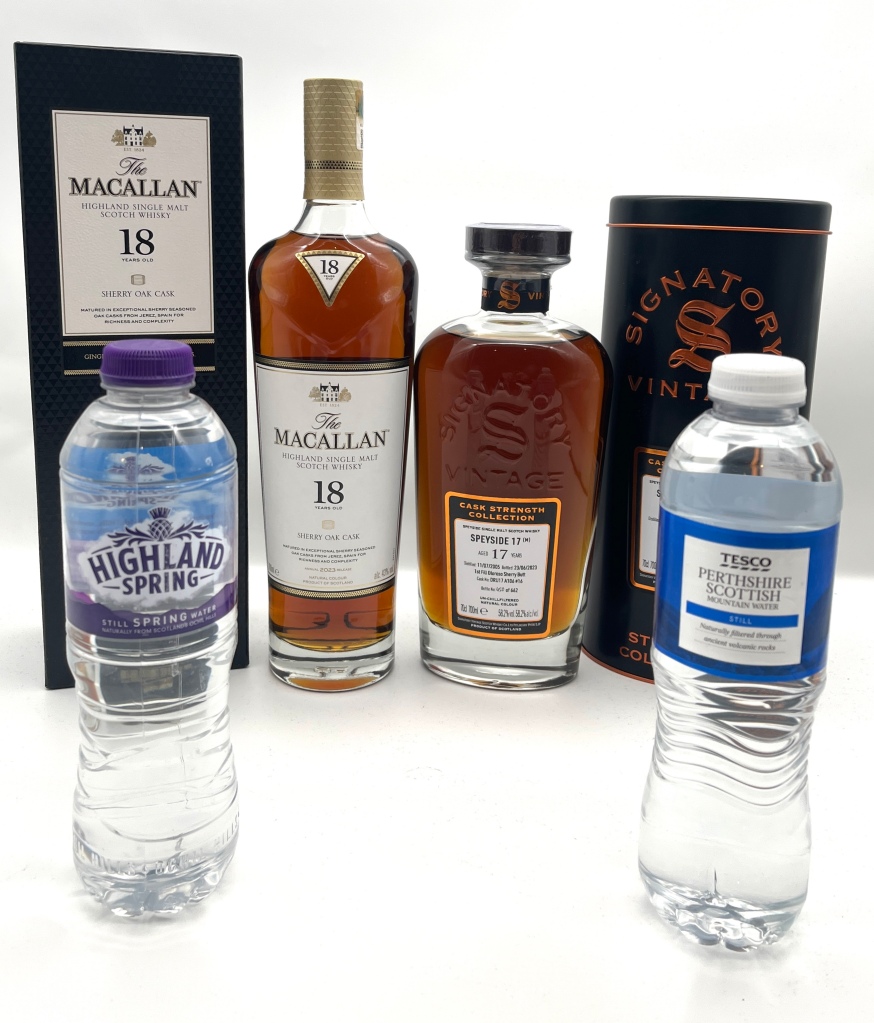
People get hung up on name and image, and that often clouds judgement as to what is good value. Let me wind this piece down with a couple of examples, including some useful advice. Firstly, we’ll look at the world of bottled water. For when I fancy a drop of water in my whisky, I take bottled. Mainly because it’s not full of chlorine, hasn’t already been through somebody a la London water and it’s easier to store it at room temperature without risking health issues. When thinking of a good brand of water in Scotland, many will fail to see past Highland Spring. And why not? it’s a good spring water, and I’ve never felt any ill effects by consuming it. But go to Tesco in Scotland especially and look at their own brand Perthshire water, especially the label that shows where the source and bottling was. Then compare it to the Highland Spring bottle label. Let me be the one to tell you that there is only one water producer in the village. Armed with that knowledge, would you then prefer to buy the Tesco own brand water, or do you stick with the image affirming Highland Spring? Let’s not forget it’s the same water in a different bottle, and 43% cheaper. It’s clear to see where the value lies in this case, without a doubt.
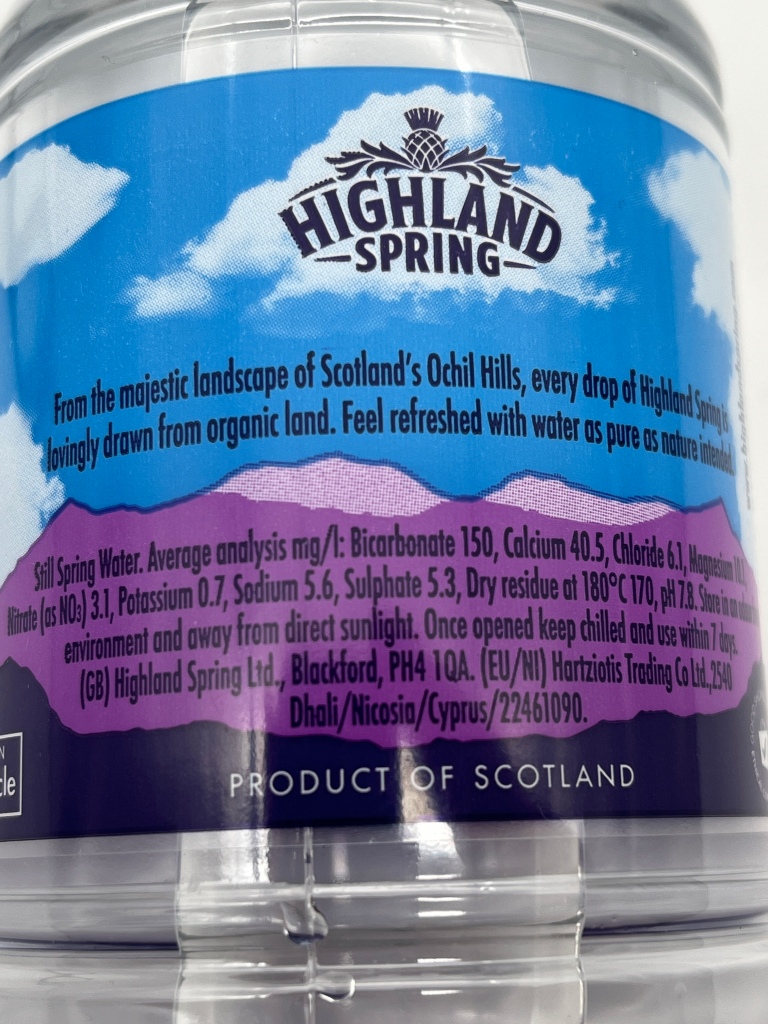
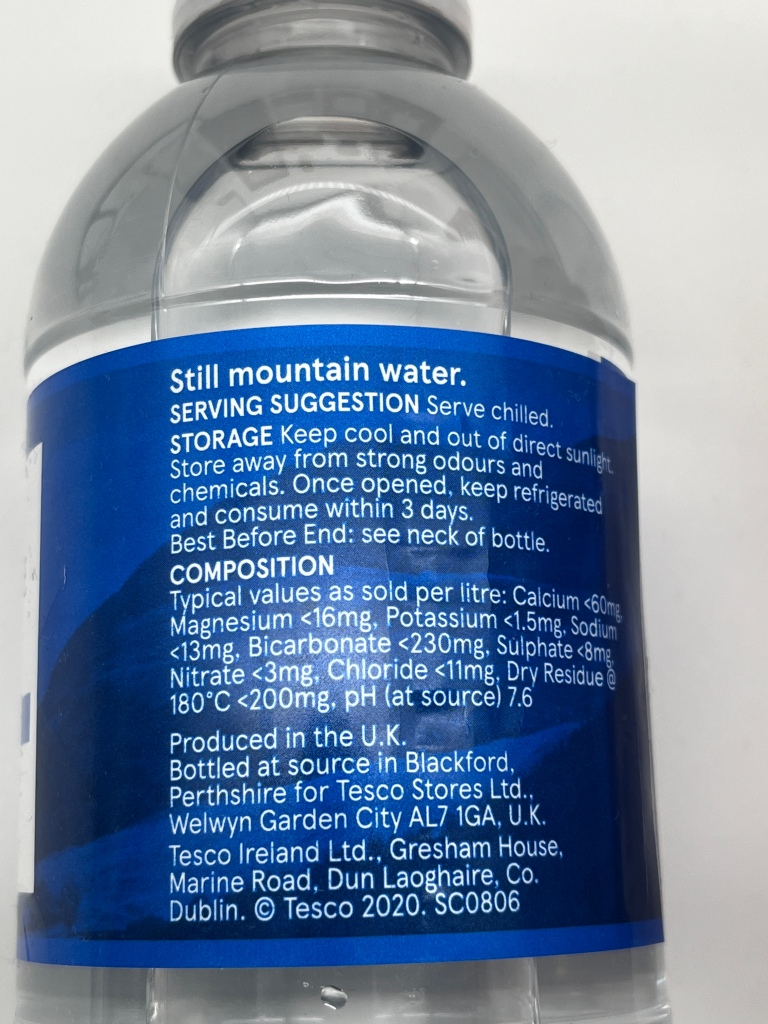
Moving to whisky and developing the analogy of the spring water, let’s compare two bottles from the same distillery. While the Signatory Macallan is a year younger, it’s birth was facilitated by the same barley, mash tun, washbacks and stills as the 18 year old. It’s even in a 1st Fill sherry butt, similar to the 18 year old. But this is a single cask, not chill filtered like much of the low strength Macallan are, and I’m assuming cask strength. The 18 year old is a batch produced whisky which may have older stock in it, yet is only 43% abv. However there is a minimum £220 difference in price. For very similar DNA whisky, you are getting charged a premium for the name. Is it value? I’d suggest not. At least this has an age statement unlike some of the NAS guff they put out with people thinking it’s worth a fortune.
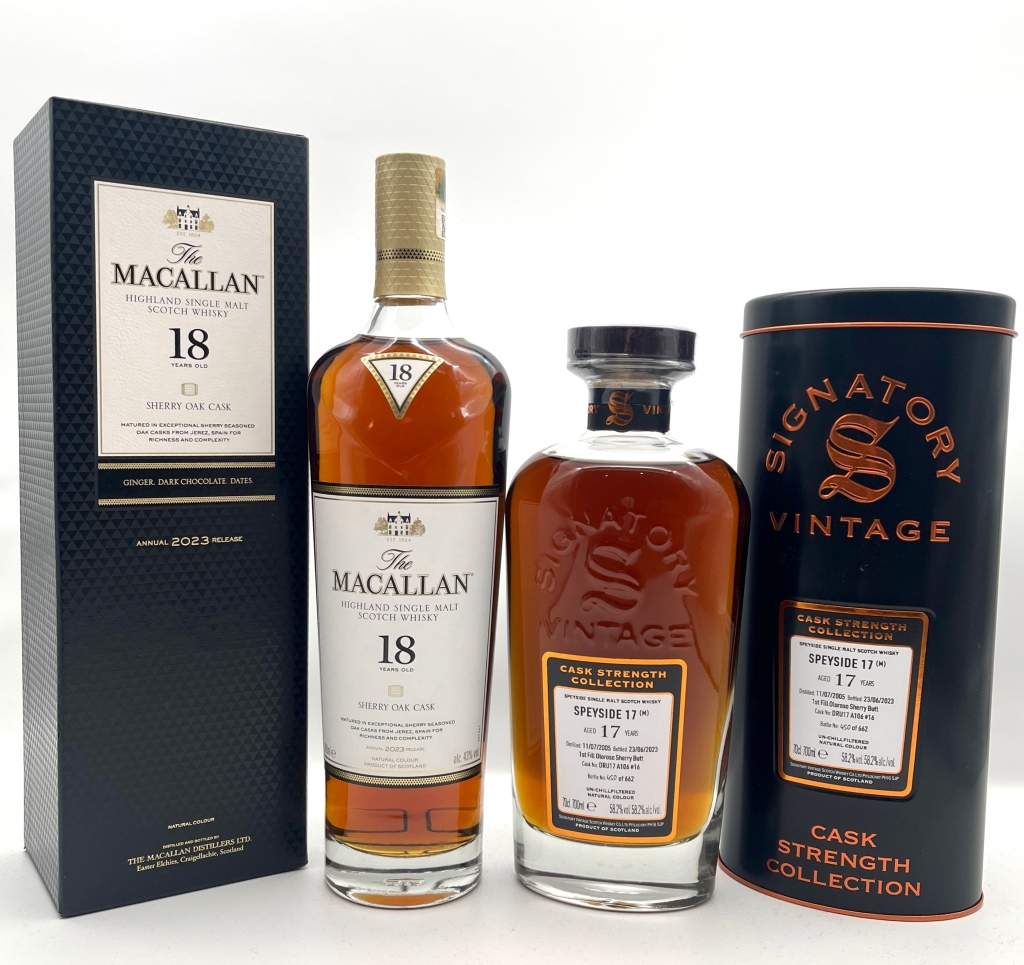
For true value, we need to look beyond the labels. Find your own inner Aberdonian (grumpiness and butteries optional), and not part with your money for fancy packaging and marketing if all you plan to do is drink it. The independently bottled Macallan is by far the better option, as it’s not been chill filtered, it’s a superior alcoholic strength, and when you drink it, although Macallan isn’t on the label, YOU KNOW that you are drinking a whisky that many other feels* think it’s appropriate to spend well over the odds for. I pity all the markets in the Americas and in particular Asia who think whisky like this is premium and get fleeced as they don’t get the same access to often superior independent bottlings.
Many own brand products in supermarkets are made in the same factories as the premium labels – the Highland Spring water being an excellent example. As prices rise and more brands look towards premiumisation, it’s important to look at what that brand offers you before making a purchase. All we really need is delicious whisky at fair prices. I can’t afford to buy an Aston Martin, and I don’t give a toss about the artwork of Peter Blake. It’s just fluff created by brand marketeers to strike a chord and separate you from your hard earned cash. I never wanted to be like Beckham when I bought a bottle of Haig Clubman, I don’t want to knock somebody’s lights out when I buy a George Foreman grill. All I want at the end of the day is good value whisky.
It’s not too hard to ask for is it?
Yours In Spirits
Scotty
*feel(s) – it’s a Doric word. If you are reading this then you’re on the internet. Look it up if you are interested. All you need to do is change the vowels.
Scotty’s Drams encourages responsible drinking. To find out the facts about drink, and where to find help if you need it visit Drinkaware.co.uk by clicking on the link.
Photo Credits
All Photos – Authors Own







